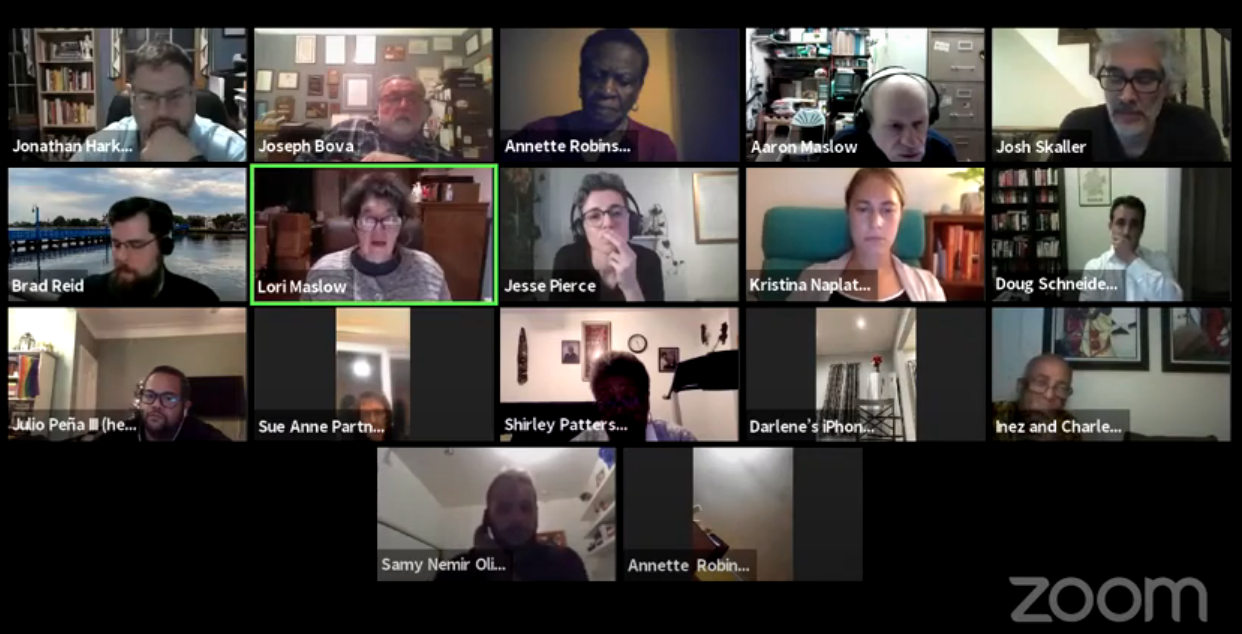“F*cking Progressives”: At Brooklyn Democratic Party Meeting, Internal Divisions Laid Bare

The Brooklyn Democratic Party’s Executive Committee meeting on Wednesday night lasted over four hours. But it took less than five minutes for the first shouting match to begin.

In a tense, interruption-filled exchange, Aaron Maslow, the chair of the party’s new Task Force on Gender Discrimination and Representation, accused District Leader Doug Schneider of bullying him.
“You’ve been bullying this entire task force, this entire group,” Schneider shot back, “in order to perpetuate a sham!”
So went the contentious leadership meeting of one of the largest local Democratic parties in the country. The purpose of the gathering, conducted via Zoom, was to appoint candidates to fill over 2,000 vacant seats in the party’s 5,500-seat County Committee, the rank-and-file governing body that votes on the party’s budget, rules, and judicial candidates.
But the meeting also served to showcase an internal divide that has riveted Democrats at every level of government, from Congress to New York’s state legislature to local political parties: an ascendant coalition of reform-minded progressives battling against a more moderate establishment that the progressives say is insufficiently transparent, democratic and accountable.
Though tensions within the Brooklyn Democratic Party have bubbled just below the surface for several years, they’ve come increasingly into public view as the number of progressive District Leaders (the elected officials who comprise the party’s 42-member Executive Committee) has grown, and as the coronavirus pandemic forces meetings that were previously held in far-flung corners of the borough onto the internet, where anyone can see them.
The severity of the divide was made explicit at Wednesday’s meeting by District Leader Frank Seddio, who also served as the party’s controversial Chair until January of this year.
“We need all the County Committee members we can get, to overcome these f*cking progressives,” Seddio exclaimed.
The acrimony on display Wednesday most immediately stems from the work of Maslow’s gender task force, which was created by party chair Assemblymember Rodneyse Bichotte earlier this year after six non-binary candidates for County Committee attempted to sue the party to force it to drop its gendered committee designations.
On Sunday, the task force voted to create several new at-large, gender-neutral seats for the 2020-2022 County Committee term. But the proposal also included what many progressives considered a poison pill: it enabled the Executive Committee to fill the new positions, as well all other vacant seats, by appointment, taking the power away from the County Committee itself.
District Leaders had to submit slates of nominees by Wednesday’s meeting, a timeframe many progressives felt was too short to properly vet candidates, and was designed to allow party leadership to fill the vacancies with loyalists.
The Executive Committee eventually approved the nominated slates for regular County Committee seats, and extended until Saturday a deadline to submit nominations for the new at-large seats. But even as the roll call vote proceeded, many District Leaders questioned its legitimacy.
“I do feel like this process was done so poorly and in some cases with such lack of transparency,” District Leader Josh Skaller said before casting his vote, “that a great deal of trust has been broken amongst the Executive Committee. And I think we all are going to have to work really hard to rebuild that trust.”
The morning after the meeting, the party published a celebratory press release that said the vote would result in “greater grassroots participation in party organizational meetings,” but even a statement by District Leader Annette Robinson included in the release tacitly acknowledged the lingering anger.
“As we saw last night, Democrats come in many shades of blue,” said Robinson. “We respect each member’s contribution to our party, and I believe that at the end of the day, we have more similarities than differences. Our commitment to civic engagement and steadfast belief in democracy is what unites us all. It is the reason we are so passionate, engaged and at times heated.”
Despite the release’s conciliatory tone, progressive District Leaders have continued to vent their frustrations on social media. They called the vote “pinkwashing” and circulated video clips from the meeting on Twitter, particularly an intense exchange that began when Seddio interrupted District Leader Julio Peña, and threatened to spend money to fight Schneider’s City Council campaign.
🥺☹️ what courage you all had, go District Leader Dream Team but also sending love to all the people that was attacked tonight💙❤️🖤💔 https://t.co/8tTbjXytoG
— Shaquana for Brooklyn (@shaquanaforbk) December 3, 2020
Frank Seddio on @bkdems meeting: “we need all of the County Committee members we can get to overcome these fucking progressives in the (organizing) meeting.”
Cats out of the bag, folks, there is an obvious effort to block progressive movement in the organization.
— Kristina Naplatarski (@kristina_nap) December 3, 2020
Peña called the meeting an example of “exactly what’s wrong with the Brooklyn Democratic Party,” and compared the party leadership’s tactics to those employed by the Trump administration.
“We’ve been demoralized and bullied the last four years from failed leadership,” Peña said. “But what we’re not going to do is allow that behavior from Democrats in our own backyard. We saw a party desperately trying to cling to power and pushing through any which way and it was a gross abuse of their elected role. I ran on transparency, equity and accountability and Wednesday’s meeting only reaffirmed how badly reform is needed.”
The make-up and power of the County Committee, whose members represent areas of just a few square blocks and are often new to party politics, was a flashpoint long before this week’s meeting. For years, the party frequently located County Committee meetings in parts of the borough difficult to access by public transit. The meetings themselves could be confusing and chaotic, and even if members voted in protest against a budget or judicial candidate put forward by the leadership, they were often overpowered by the County Chair, who controlled hundreds of votes by proxy.
“This process is always heavy-handed,” Assemblymember Charles Barron, a long-time District Leader, said on Wednesday. “And sometimes when we vote for a position it’s very scripted. Even when it was a larger meeting, the chair would have five, six hundred proxy votes, the abuse of the proxy vote system, and not really having Democrats at the ground level has always been a challenge and a problem for us.”
When Bichotte took over the reins of the party from Seddio in January, becoming the first Black woman in the role, some speculated the machine politics that had long dominated Brooklyn would become a thing of the past.
So far, that does not seem to be the case. In September, the party cancelled its legally-required County Committee meeting, citing the pandemic, even though parties in other boroughs had found ways to host their meetings virtually. The move resulted in a lawsuit filed by County Committee members, which is making its way through state courts. Bichotte did not attend Wednesday’s meeting and did not respond to a request for comment.
That lawsuit, as well as the suit on gender equity, was supported by the progressive political club New Kings Democrats, which has largely led the push for party reform. They launched an initiative called “Rep Your Block” to recruit candidates for the County Committee, and this year endorsed a slate of five progressive District Leaders, all of which won in their June primary elections.
NKD’s Communications Director, Caitlin Kawaguchi, told Bklyner that Seddio’s comments about progressives “only verbalized what the Party’s actions have long demonstrated — that many District Leaders see County Committee seats as theirs for the taking. This is fundamentally undemocratic, and weakens the Party as a whole by disengaging Brooklyn Democrats when we should be building the Party.”
Kawaguchi’s concern that the County Committee fight could have implications for the Democratic Party’s work was echoed explicitly by other progressive District Leaders, who framed their fight as part of a broader frustration with the Democratic establishment.
“Shifting away power from the County Committee, the people that really get at the vibrancy of our party, is shooting ourselves in the foot,” Samy Nemir Olivares, one of the NKD-endorsed District Leaders who was elected this year, said at Wednesday’s meeting. “And it’s just telling of why we continue to lose primaries, why all of the insurgent District Leaders like me won this election. And it’s also telling of why other groups, like the Democratic Socialists of America and the Working Families Party, are actually showing us how we should be organizing. I am alarmed by the direction we are moving forward.”
NKD’s activism has generated antagonism from some establishment Democrats, who have at times accused them of engaging in “political gentrification.” But the fight against party leadership has extended beyond just one club.
Christina Das, the President of the Brooklyn Young Democrats, told Bklyner she believed the party was using nonbinary and gender non-conforming people as “a bargaining chip to advance an undemocratic agenda that takes away power from the grassroots of our party–and in the middle of a pandemic, no less.” Earlier this year, Das and fellow BYD member John Wasserman were removed from the June primary ballot as judicial delegates in what they call an act of retribution for pushing back against party leaders who had asked them to canvass during the pandemic.
Several elected officials and candidates not normally involved in party operations also made public comments about the meeting, a sign that the internal party dispute is beginning to draw broader attention.
Just take a listen and ask yourself: Who is "really"" running the @bkdems ⁉️ I was proud to hear so many new voices rising up with courage and standing tall for REAL Democracy ✊🏿✊🏿 #WeSeeYou https://t.co/rcICE5hqwA
— Diana Richardson (@YourFavoriteASW) December 3, 2020
.@bkdems, we see you.
— Senator Zellnor Y. Myrie 米维 (@zellnor4ny) December 3, 2020
Our Democratic Party should be inclusive, transparent, and accessible for all. Empowering and collaborating with grassroots activists should always be the priority. But instead, the machine is pulling every trick in their book to exclude activists. Brooklynites deserve better.
— Shahana Hanif for City Council (@ShahanaFromBK) December 3, 2020
Some District Leaders who supported the gender equity proposal expressed frustration at the progressives’ accusations of impropriety. Darma Diaz, a District Leader who last month was elected to fill the City Council seat vacated by Raphael Espinal, said the Executive Committee vote was an attempt to act “in good faith to demonstrate that each of us understood the need for being inclusive.”
“We could have dismissed the recommendation, which we didn’t,” Diaz told Bklyner. “As Brooklynites, we should continue to learn and grow, and work together on, not against the progress we have made thus far.”
It seems likely, however, that the unity Diaz is calling for will remain a chimera for some time.
“We are here to say it’s not going to be business as usual,” said Schneider. “We are going to fight to bring democracy and transparency to the party, and we are going to win.”




